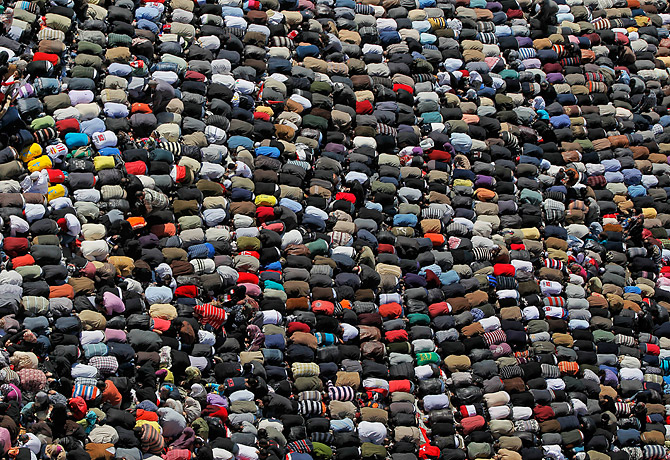
Tens of thousands of Egyptians gather during celebrations of Hosni Mubarak's fall from power to pray — and to maintain pressure on the current military rulers — in Tahrir Square in Cairo on Feb. 18, 2011
Ahmed and Ibrahim are old family friends in their late 20s, both are well-educated young men from wealthy families, part of Cairo's elite class, and both say they would lay down their lives for a better Egypt. That's where their similarities end.
Ahmed is a veteran of the 18-day anti-government protests in Tahrir Square and, along with several others, is in the process of forming a non-governmental organization to promote political awareness and citizen's rights. Ibrahim is a three-star officer in the much-despised police force and a supporter of former President Hosni Mubarak's regime.
In the past month or so, the pro- and anti-Mubarak camps have rarely come together without heated exchanges or deadly blows, but on a recent chilly evening in Cairo TIME was invited to hear a candid discussion over glasses of sweet tea and several packs of cigarettes between two old friends who are ideological foes.
Ibrahim listens intently as Ahmed excitedly recounts his time in Tahrir in great detail. An empty soft drink crate served as his helmet, Ahmed says, as he lobbed stones and clumps of rubble across a makeshift corrugated iron barricade he and his friends had erected. "We had designated some of the protesters as 'commandos,'" Ahmed says, "It was their job to go into the buildings around the square and try and attack the snipers. What about the snipers? Why did you use them on us?"
"I do not defend the police," Ibrahim says. "I'm not saying they're all good. But why weren't the police who died considered martyrs?"
Ahmed, a stocky man with boyish good looks that make him look several years younger, abruptly jumps to his feet. "Look at this," he says as he furiously scrolls through his mobile phone before leaning in toward Ibrahim. "This is a picture of a martyr in uniform and it's in Tahrir Square!"
Ibrahim slides back in his chair. "Okay, I didn't know that."
Ahmed returns to his seat, a smug satisfaction plastered across his face.
Ibrahim is a clean-shaven lanky young man with deep black eyes, short gelled-hair and an assertive tone. He thinks the country's emergency law, which has been almost continuously in effect since 1967, should not be repealed. (Egypt's transitional military leaders say they will lift it in six months.) The law gives the police wide powers to arrest suspects and hold them for an indeterminate period, as well as circumscribes political and street activity. Ibrahim says that the right to hold suspects indefinitely while they await trial is necessary, lest they skip bail. Ahmed says that a person should be considered innocent until proven guilty, that a suspect's travel documents can be confiscated to ensure compliance with bail and that it's unlikely a suspect would jeopardize his chances by committing a crime while he is out on bail.